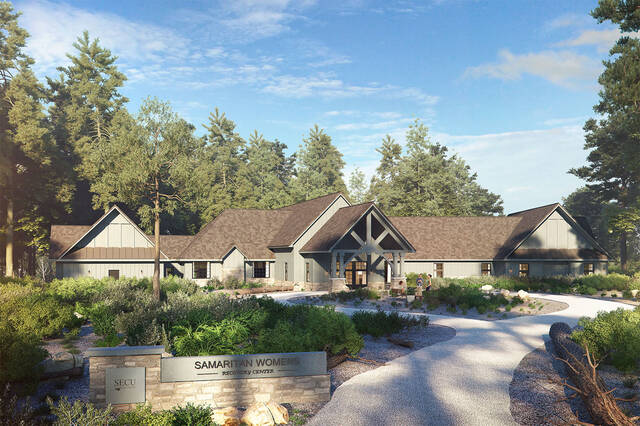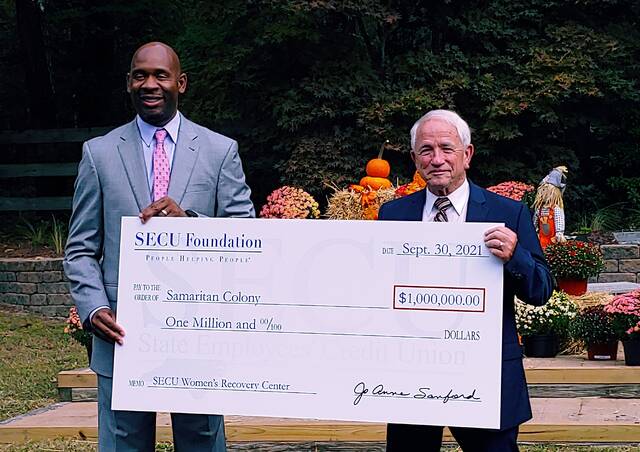
Photo courtesy of Samaritan Colony
This is a rendering of the future SECU Women’s Recovery Center, designed by Stogner Architecture.
ROCKINGHAM — The State Employees Credit Union on Thursday awarded Samaritan Colony a $1 million grant to support their planned Women’s Recovery Center, a 14-bed residential drug and alcohol addiction treatment center that will operate alongside their existing treatment center for men.
Samaritan Colony’s planning for the new facility had stalled for a period while they sought funding, a period which was elongated by the COVID-19 pandemic, but this gift has finally allowed them to cover the cost of construction, according to Executive Director Harold Pearson and Program Director Constance Pearson, who will run the Women’s Recovery Center (WRC).
The nonprofit, which is a partner agency of the United Way of Richmond County, applied for a grant from SECU in 2019 and in October 2019 received a $40,000 Capacity Building grant from SECU, but the credit union wanted greater assurance of the WRC’s longevity before awarding a grant of this magnitude. They asked Samaritan Colony to complete several requirements: take a year to work with a consultant — Funding for Good — on capacity planning; hire a development director, which they did in Maggie Sergio, whose sole responsibility will be fundraising; and establish a succession plan for the executive director position, which Sergio said is a standard ask from funding organizations.
This process involved establishing formal fundraising practices, planning for growth and training its governing board, according to Sergio. They have planned a fundraising effort for Giving Tuesday (the first Tuesday after Thanksgiving), they’ve developed a peer-to-peer fundraising plan, former patients have offered to help raise money and Sergio and the board members will also be working with individual donors on a regular basis.
Constance said that taking these steps to establish the WRC’s longevity will have a positive impact on the eventual facility and its operations.
“Instead of saying ‘we’ll trust God to keep us afloat,’ we now have a concrete plan,” Constance said.
With the awarding of this grant, the facility will now be called the “SECU Women’s Recovery Center.”
“SECU Foundation is proud to support Samaritan Colony’s efforts in building a women’s treatment facility to offer lifesaving services,” said SECU Foundation Executive Director Jama Campbell in a press release. “We realize the toll that substance abuse takes on individuals, families, and our communities and want to help organizations like Samaritan Colony expand their reach to more folks in need. On behalf of the 2.6 million SECU members that fund our Foundation, we thank Samaritan Colony leadership and staff for all they are doing to make a difference in their community and region.”
The Pearsons expressed immense gratitude to SECU’s leadership and members. Harold said they were “overjoyed” by SECU’s gift, and Constance added that she was moved to tears at the ceremony Thursday morning where they were presented with a giant check.
“Without this gift, we wouldn’t be able to move forward — it’s a big shot in the arm allowing us to make this a reality,” Constance said in an interview Thursday.
Sergio added that this money will “save a lot of lives.”
The Pearsons expect to now be able to break ground on the site in January 2022 and have targeted September or October for completion of the building. They hope to be able to open their doors by the end of 2022. Site development work is ongoing. They told the Daily Journal in August 2018 that they expected to begin construction the following spring, until the delays hit.
The need for services
Samaritan Colony’s men’s facility has been operating since 1972 and serves individuals within the eight-county area of Anson, Harnett, Hoke, Lee, Montgomery, Moore, Randolph, and Richmond Counties. It offers a 12-Step facilitation program that employs a variety of evidence-based therapies, as well as character-building classes. It includes both individual and group therapy, offers family counseling and life skills training.
Sergio said that the need for a residential substance abuse treatment facility for women — the first in Richmond County — has never been in question and has only increased since the pandemic.
In a letter signed by members of Daymark Recovery Services and sent to Governor Roy Cooper in support of Samaritan Colony being granted approval for adding 14 residential treatment beds in 2018, they wrote, “The female residents of our county who currently need residential addiction treatment must travel substantial distances away to either Path of Hope in Lexington [with only 6 beds]… which is an hour and twenty minutes’ drive; or all the way to R. J. Blakely, Alcohol and Drug Abuse Treatment Center in Butner.”
Samaritan said in a document outlining the need for the new facility and the projected costs that because of this lack of affordable addiction treatment in central North Carolina, women seeking treatment are often put on a waiting list for several weeks or more.
“Many women have no choice but to travel 100 miles or more to receive life-saving treatment,” Samaritan wrote.
Women have different needs than men when it comes to addiction treatment, according to Sergio, and the WRC will be gender-specific. Their treatment will focus more on addressing past trauma and has to take into account various other cultural influences women face that lead to things like body image issues, which Constance said is often tied to the use of stimulants in women. Female addicts are also more often dealing with childcare-related issues, including the fear of losing custody.
Constance added that the time between when women first start using and when they develop a physical dependence is shorter than for men. According to the National Institutes of Health, men are more likely to use most types of drugs and have higher rates of dependence in most age groups, but women are just as likely to develop an addiction. NIH cites research that shows that women can be more susceptible to cravings and relapse, complicating the recovery process.
“This is something that’s been needed for so long,” said Harold. “I’m looking forward to seeing women’s lives changed as much as we’ve changed men’s … Seeing families put back together, children having their mothers again.”
According to the Centers for Disease Control, there were 81,000 drug overdose deaths in the U.S. in the 12 months prior to May 2020, which is the highest amount of overdose deaths over that time span in history. Since the pandemic, data suggests that overdose deaths continue to accelerate. Comparing the periods of May 2018 – May 2019 and May 2019 – May 2020, there has been a 38.4% increase in overdose deaths, which is primarily due to synthetic opioids such as fentanyl, the CDC said in December 2020.
Additionally, over this time span overdose deaths due to cocaine increased by 26.5%, likely due to it being consumed in conjunction with fentanyl. And overdoses deaths due to psychostimulants like methamphetamine have increased by 34.8%, according to the CDC.
Data from the North Carolina Overdose Dashboard shows that in Q4 2019 (Oct. 1 to Dec. 31) there were 375 unintentional opioid-related deaths, while there were 1,630 in the first six months of 2020.
“The disruption to daily life due to the COVID-19 pandemic has hit those with substance use disorder hard,” said CDC Director Robert Redfield in a press release. “As we continue the fight to end this pandemic, it’s important to not lose sight of different groups being affected in other ways. We need to take care of people suffering from unintended consequences.”
The impact of the pandemic has been felt at Samaritan Colony’s existing facility, their 12-bed residential treatment center for men. Constance said that many of the resources that would have been given to mental health treatment have not been there, reducing people’s ability to access counseling. Samaritan had to reduce their bed capacity from 12 to 9 in order to provide space to quarantine any patients that tested positive for COVID-19 or were exposed to it during their 28-day stint there for treatment.
Thankfully, according to Constance, no one at their facility has tested positive for the virus.
Other funding sources
Samaritan’s fundraising goal to pay for building costs was $3.4 million, which they’ve now surpassed thanks to SECU, according to Constance. Factoring in the operations and staffing costs ($1.4 million) and the cost of the endowment fund for scholarships ($500,000), the total cost of the facility for the first 3 years is estimated to be $5.3 million, which they’ve yet to reach.
They received $150,000 from the Cannon Foundation out of Concord last week for the WRC, Sen. Tom McInnis included a $50,000 one-time appropriation in the fiscal year 2018-2019 budget, Quality Oil and Gas donated $5,000 in February 2019, and former Samaritan Colony patient Aaron Rich completed a 100-mile run in under 24 hours in September 2019 that raised more than $3,700. The nonprofit is also supported by the Sandhills Center.
Samaritan also has a pending application with the Leon Levine Foundation. The Pearsons have not yet applied for funding from the Cole Foundation or the Richmond Community Foundation, nor have they been invited to do so, but said they plan to revisit that option in the future. The Cole and Community foundations previously awarded grants to Samaritan Colony in 2008 when they needed to purchase 19 acres of land adjacent to their existing property to expand their septic system. This left that area open to development and is now the future site of the WRC.
Several of the foundations and funding sources the Pearsons have networked with in the past were paying attention to whether SECU would award them this $1 million grant, though these other potential grants were not contingent on SECU’s decision, Harold said. Now, as Constance put it, they won’t have to ask these other sources to fund a “building that doesn’t exist.”
“We really needed [the SECU grant],” she said. “With them backing us, it gives us so much more credibility.”
Harold hopes that receiving this grant will open up the door for more, smaller grants.
Anyone interested in supporting the WRC can call Sergio at 910-895-3243 or email her at msergio@samaritancolony.org.
The facility
Governor Roy Cooper approved Samaritan Colony’s request to add the 14 beds needed for the WRC in January 2018, and Richmond County Environmental Health gave verbal approval to construct its new facility on its property around the same time. The North Carolina Department of Health and Human Services granted Samaritan Colony their certificate of need in February 2019, after first petitioning the state in 2017.
Constance said Samaritan Colony has got an “awesome” new board of directors who meet monthly and have been more engaged.
The WRC will be a 14-bed facility with 10 total staff members, as opposed to the 12-bed men’s facility with 8 staff members. The staff at the WRC will be all female and will include licensed clinical addiction specialists, peer-support specialists, night staff, an administrative staff member, and a cook, according to Harold.
The 13,000 square foot building was designed by the Rockingham-based Stogner Architecture. It will be on Samaritan Colony’s land slightly north of the current facility, which is located off of U.S. 220 North on Samaritan Drive.
Rockingham-based Southern Builders will be the general contractor on the project, and the North Carolina Baptist Men (or Baptists on Mission) will do at least 65% of the construction free of charge, according to Constance. The Baptist Men verbally agreed to assist in construction in summer 2019 and visited the site with Southern Builders in the last few weeks.
The local Baptist Men travel around the country supporting natural disaster recovery efforts and offer free labor on various community projects. For example, in 2018, the Baptist Men built The Matthew 25 Center, a 5,800 square foot house for families of prison inmates to stay in when they come to visit them, in Tabor City along the South Carolina border. They’ve also been involved in building dozens of access ramps at the homes of people with physical disabilities who can’t afford to build one themselves.
Constance said they’ve entrusted the Baptist Men with this work because of their large network of craftsmen. She called their willingness to serve “beautiful.”
“These are the projects we take on when we don’t have a hurricane or tornado to deal with,” said Baptist Men member Dennis Holloway in an interview with the Daily Journal in 2019. “[The projects we choose are] always one that needs community involvement, and this one is the need in the area. The men’s treatment center has been a great success but we’ve needed a facility for women for a long time and [Samaritan] already had the land.”
The collective effort going into this project reminded Constance of SECU’s slogan: “people helping people.”
“This facility is being built on the love of community,” Constance said. “This is a community project, this isn’t something that we’re doing [by ourselves] — we’re doing it together.”
To support the Daily Journal, subscribe by calling 910-997-3111 or visiting https://www.yourdailyjournal.com/subscribe.
Reach Gavin Stone at 910-817-2673 or gstone@www.yourdailyjournal.com.





